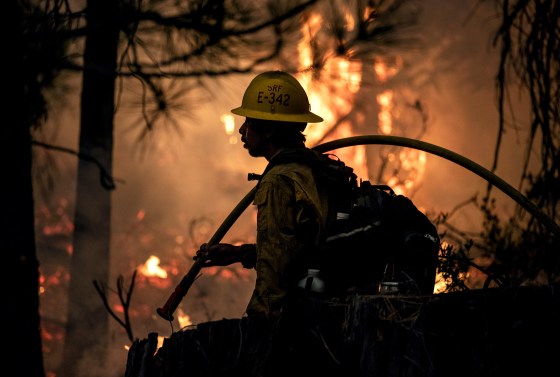Federal wildland firefighters, some of whom earn around $20 an hour for grueling and often life-threatening work, will soon see a reprieve from housing woes that have long plagued their ranks.
On Tuesday, U.S. Forest Service Chief Randy Moore sent a letter to employees announcing a temporary rent refund program for U.S Forest Service employees living in government housing. It will impact from 4,500 to 5,500 employees retroactive to March 10.
The refund will cover up to 50% of rent for certain employees. Staff in the higher ranks could be eligible for a 10% rent refund, according to the memo.
"Housing affordability significantly affects the lives of employees across the agency,” Moore said in the letter, obtained exclusively by NBC News. “We are taking this action with the authority and resources available to us. We need to use all the tools in our toolbox, even if they aren’t as far-reaching as we’d like.”
Federal wildland firefighters have fought for years to increase their wages and better their living conditions as fires become increasingly dangerous.
Forest Service employees living in government housing have complained about moldy walls, broken toilets, long commutes and even bedbugs.
About 1,600 Forest Service firefighters, or more than 10% of the wildland fire workforce, lived in government housing last year, the U.S. Department of Agriculture, which oversees the agency, said in a statement.
"Due to increasing demand and the preference for short-term rentals in the private market," the USDA said, "there is limited or no housing availability in locations nearest to work duty stations including ski resort communities, mountain town communities, and rural areas.”
Frustrated by the ongoing problems, federal firefighters continue to leave for higher wages at state and municipal departments. This summer, dozens of federal fire engines remain unstaffed amid another wave of firefighter exoduses.
Advocates for firefighters have warned in recent years that the ongoing attrition rates could leave the agency, which protects millions of acres of public land across the country, bereft of its most experienced and skilled workers.
“The men and women serving in the USDA Forest Service deserve adequate and livable housing. Housing costs have skyrocketed in recent years, in both urban and rural areas, causing serious hardships for Forest Service employees," Randy Erwin, president of the National Federation of Federal Employees, said in a statement.
"The actions announced today will go a long way towards alleviating housing issues and will help our dedicated workers in the Forest Service improve their quality of life," he added.
The Forest Service faces a Sept. 30 funding deadline, when a $20,000 or 50% retention bonus established by the Infrastructure Investment and Jobs Act in 2021 could expire.
If that happens, starting wages would revert to the federal employee minimum of $15 an hour, a rate the Government Accountability Office said in a report “does not reflect the risk or physical demands of the work.”
In the meantime, the Forest Service said it's prioritizing the repair and replacement of bunkhouses, dormitories, duplexes, single-family homes and trailer pads used by employees.
It also said President Joe Biden's proposed budget for fiscal year 2025 includes a $25 million request "to perform critical facility maintenance work to improve the condition of government housing for Forest Service wildland firefighters and other essential employees.”

